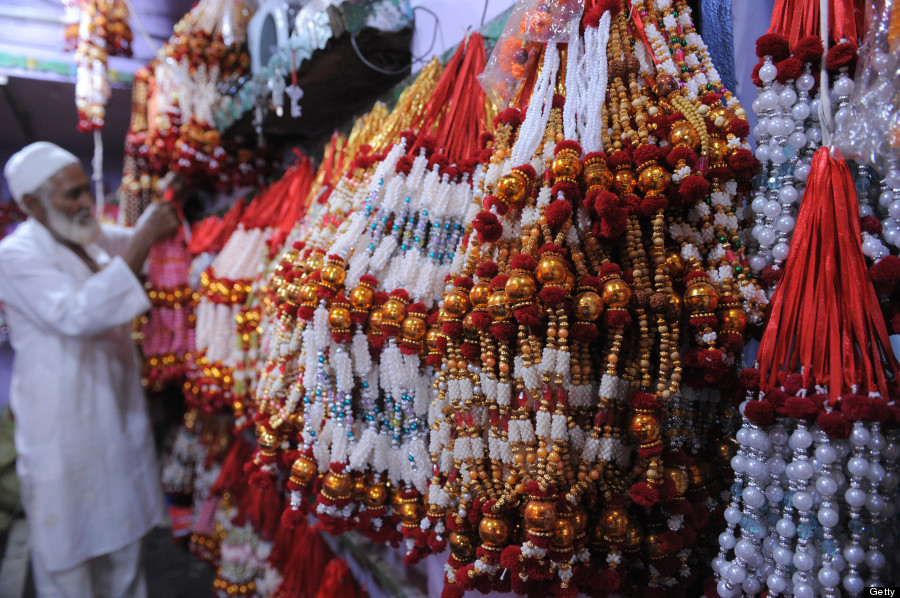In 2013, Diwali, the festival of lights, will be celebrated on Nov. 3 by Hindus, Jains and Sikhs. The word Diwali comes from the Sanskrit deepavali, which means a row of lights.

Indians buy lanterns from roadside stalls ahead of Hindu festival of lights Diwali, in Mumbai, India, Sunday, Oct. 27, 2013.

A view of the illuminated Akshardham Temple in Gandhinagar, some 30 kms from Ahmedabad, is pictured ahead of Diwali festivities, on November 1, 2013.
The festival of Diwali symbolizes the victory of light over dark, good over evil and knowledge over darkness.

An Indian craftsman paints clay 'diyas' (earthen lamps) ahead of the Hindu festival of Diwali in Amritsar on October 29, 2013.
Diwali is one of the biggest festivals in the Hindu calendar and there are multiple reasons why Hindus celebrate this festival. The most popular narrative, based in the ancient Sanskrit epic Ramayana, is of Lord Rama, his wife Sita and brother Lakshmana returning to their kingdom Ayodhya after defeating the demon king Ravana. On that dark new moon night, the residents of Ayodhya joyfully lit oil lamps to welcome Rama, Sita and Lakshmana back to the kingdom.

Defying traditions widows of Vrindavan celebrate Diwali at their ashram at Vrindavan on October 31, 2013 in Mathura, India. These aged widows have been abandoned by their families or have fled their inhospitable homes, to make Vrindavan their home or their last destination. To kindle happiness in their twilight years, Sulabh International founder Bindeshwar Pathak has come up with the idea of organizing the festival of lights for these widows, locally known as matas.
Following in that tradition, Hindus celebrate Diwali by lighting oil lamps, bursting firecrackers, cleaning and decorating their homes, distributing sweet delicacies and gathering with friends and family.

Indian women browse cookies ahead of the upcoming Diwali festival celebrations in the Brickfields area, also known as Little India, in Kuala Lumpur on October 21, 2013.
In Hindu homes around the world, people gather to offer prayers to Sita and Rama, Radha and Krishna, Lakshmi, the goddess of wealth, Ganesh, the god of auspiciousness. For many in the Hindu community, Diwali is also the beginning of a new year. A popular greeting around this time is "Shubh Diwali."

An Indian potter makes earthen lamps ahead of the Diwali festival in Ahmadabad, India, Thursday, Oct. 24, 2013.
In the Sikh tradition, Diwali commemorates the release of Guru Hargobind, the sixth Sikh Guru, who was imprisoned by the Mughal emperor Jahangir. When Guru Hargobind arrived in Amritsar, his devotees lit thousands of oil lamps to celebrate his return. For Sikhs, this day is known as Bandi Chhor Divas (day of release from prison). Sikhs celebrate Diwali by lighting oil lamps and reading from the Guru Granth Sahib, the Sikh holy text.

Indians buy lanterns from roadside stalls ahead of Diwali, the Hindu festival of lights, in Mumbai, India, Thursday, Oct. 31, 2013.
In the Jain tradition, Diwali marks the attainment of enlightenment by Lord Mahavira, the 24th Tirthankara of Jainism who laid down the central tenets of the Jain religion as it is practiced today. Jains celebrate Diwali by lighting lamps, distributing sweets, fasting and practicing acts of charity.

A Malaysian ethnic Indian woman dries her hand after getting it painted with henna for the upcoming Diwali, or the Hindu festival of lights in Klang, outside Kuala Lumpur, Malaysia, Thursday, Oct. 31, 2013.

Indian Muslim shop owner, Nasurullah Abdul Majid, 70, arranges silk garlands ahead of Diwali festivities at their shop in Ahmedabad on October 21, 2013.

Indians buy lanterns from roadside stalls ahead of Hindu festival of lights Diwali, in Mumbai, India, Sunday, Oct. 27, 2013.

A view of the illuminated Akshardham Temple in Gandhinagar, some 30 kms from Ahmedabad, is pictured ahead of Diwali festivities, on November 1, 2013.
The festival of Diwali symbolizes the victory of light over dark, good over evil and knowledge over darkness.

An Indian craftsman paints clay 'diyas' (earthen lamps) ahead of the Hindu festival of Diwali in Amritsar on October 29, 2013.
Diwali is one of the biggest festivals in the Hindu calendar and there are multiple reasons why Hindus celebrate this festival. The most popular narrative, based in the ancient Sanskrit epic Ramayana, is of Lord Rama, his wife Sita and brother Lakshmana returning to their kingdom Ayodhya after defeating the demon king Ravana. On that dark new moon night, the residents of Ayodhya joyfully lit oil lamps to welcome Rama, Sita and Lakshmana back to the kingdom.

Defying traditions widows of Vrindavan celebrate Diwali at their ashram at Vrindavan on October 31, 2013 in Mathura, India. These aged widows have been abandoned by their families or have fled their inhospitable homes, to make Vrindavan their home or their last destination. To kindle happiness in their twilight years, Sulabh International founder Bindeshwar Pathak has come up with the idea of organizing the festival of lights for these widows, locally known as matas.
Following in that tradition, Hindus celebrate Diwali by lighting oil lamps, bursting firecrackers, cleaning and decorating their homes, distributing sweet delicacies and gathering with friends and family.

Indian women browse cookies ahead of the upcoming Diwali festival celebrations in the Brickfields area, also known as Little India, in Kuala Lumpur on October 21, 2013.
In Hindu homes around the world, people gather to offer prayers to Sita and Rama, Radha and Krishna, Lakshmi, the goddess of wealth, Ganesh, the god of auspiciousness. For many in the Hindu community, Diwali is also the beginning of a new year. A popular greeting around this time is "Shubh Diwali."

An Indian potter makes earthen lamps ahead of the Diwali festival in Ahmadabad, India, Thursday, Oct. 24, 2013.
In the Sikh tradition, Diwali commemorates the release of Guru Hargobind, the sixth Sikh Guru, who was imprisoned by the Mughal emperor Jahangir. When Guru Hargobind arrived in Amritsar, his devotees lit thousands of oil lamps to celebrate his return. For Sikhs, this day is known as Bandi Chhor Divas (day of release from prison). Sikhs celebrate Diwali by lighting oil lamps and reading from the Guru Granth Sahib, the Sikh holy text.

Indians buy lanterns from roadside stalls ahead of Diwali, the Hindu festival of lights, in Mumbai, India, Thursday, Oct. 31, 2013.
In the Jain tradition, Diwali marks the attainment of enlightenment by Lord Mahavira, the 24th Tirthankara of Jainism who laid down the central tenets of the Jain religion as it is practiced today. Jains celebrate Diwali by lighting lamps, distributing sweets, fasting and practicing acts of charity.

A Malaysian ethnic Indian woman dries her hand after getting it painted with henna for the upcoming Diwali, or the Hindu festival of lights in Klang, outside Kuala Lumpur, Malaysia, Thursday, Oct. 31, 2013.

Indian Muslim shop owner, Nasurullah Abdul Majid, 70, arranges silk garlands ahead of Diwali festivities at their shop in Ahmedabad on October 21, 2013.






.jpg)






